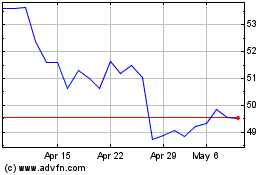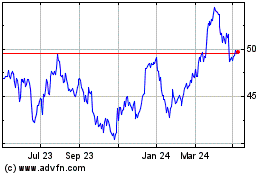BASF Hauling More Product by Road as German Train Strike Starts -- OPIS
25 January 2024 - 5:41AM
Dow Jones News
German chemicals major BASF expects a six-day nationwide rail
strike in Germany starting Wednesday will have more of an adverse
impact on hauling the company's products than previous strikes and
necessitate a greater use of road transport.
"In normal circumstances, we handle about 30% of our transports
by rail. Due to the rail strike, we are now forced to shift railway
transports on a large scale to trucks," said Uwe Liebelt, President
of European Verbund Sites at BASF, in a statement shared with OPIS
on Wednesday. "This will increase logistics costs and CO2
emissions."
BASF said that it had taken measures to cushion the effects of
the upcoming strike on production sites and customers, but added
that its operations were still recovering from adverse weather and
a previous rail strike earlier in January.
"The fact that the strikes are occurring very close together,
giving BASF very little preparation time, and the existing backlog
due to last week's snowfall that has not yet been cleared,
significantly complicates the situation," the company's statement
said.
The international competitiveness of Germany, "which is already
under considerable pressure due to high energy and raw material
costs, will be further damaged," said Liebelt, who is in charge of
BASF's chemical production sites that have highly interlinked
product flows.
BASF's Ludwigshafen site is one of the world's largest
integrated chemical complexes. The site is home to a dense network
of 200 plants that create a variety of products and petrochemicals
for diverse industries, according to the company's website.
The company declined to say whether run rates at any of its
sites have been impacted by the strike.
German train drivers began the record six-day strike starting
January 24 after their union rejected state-owned rail operator
Deutsche Bahn's latest wage offer. The country's cargo train
drivers began their strike on the evening of January 23.
GDL, the trade union representing Germany's train drivers, said
the fourth round of strikes in the ongoing wage dispute will last
until January 29, 6pm Central European Time.
Later on Wednesday, Germany-based chemicals producer Covestro
told OPIS that there were no "restrictions" on production at its
sites due to the strikes.
"We have made the best possible preparations for the strike and,
wherever possible, switched to road and inland waterway
transportation at an early stage," said a spokesperson for the
company. "We currently see only limited effects on Covestro and can
continue production without restrictions. At the same time, the
changeover is naturally accompanied by increased operating
expenses."
This content was created by Oil Price Information Service, which
is operated by Dow Jones & Co. OPIS is run independently from
Dow Jones Newswires and The Wall Street Journal.
--Reporting by Fahima Mathé, fmathe@opisnet.com; Editing by
Anthony Lane, alane@opisnet.com
(END) Dow Jones Newswires
January 24, 2024 13:26 ET (18:26 GMT)
Copyright (c) 2024 Dow Jones & Company, Inc.
BASF (TG:BAS)
Historical Stock Chart
From Dec 2024 to Jan 2025

BASF (TG:BAS)
Historical Stock Chart
From Jan 2024 to Jan 2025
